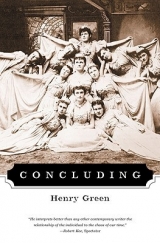
Текст книги "Concluding"
Автор книги: Henry Green
Жанр:
Современная проза
сообщить о нарушении
Текущая страница: 8 (всего у книги 14 страниц)
She found a number of her charges waiting, unconcerned, by the side of that horrible pile of blooms.
She concentrated on Moira, in whom she had sensed almost an antagonism these last few weeks.
"Here we are, dears," she cried out gaily, at her most genuine. It would be enough, in a day or two, to think of the implications with Merode s aunt, when they came to write out their Report.
"Moira, will you take the satin ribbon out of that drawer and divide it into twenty-one inch lengths? You will find scissors at the back. Then you must cut it square, with two v's afterwards at each end. Be as neat as you can, child. Tie the branches in bundles. Now the others," and she approached the pyre with a distaste they did not seem to share. "We'll have you parcelling bundles up." She flicked with a long handkerchief at the blooms, was relieved to find no flies. They misunderstood the gesture.
"Oh, we sprinkled with water to keep fresh," two or three sang out. "We've put sheets of paper round to save the floor," they added, and then scent from that mass of flowers came over her again. She was heartened to find this sharp as wine, now day was cooler.
"How will I tell the inches?" Moira enquired, while her companions attacked the pile.
"Hurry, Moira," they called. "We'll catch up in no time."
"Marion, fetch the steps," Edge ordered, relieved that the senior had recovered from her last bout of crying. "Judge the best way you can, dear," she said to Moira, and thought I must have been poorly at lunch, it was the heat, forgetting she had felt so bad at tea. "Busy as bees, aren't we?" she added aloud, standing dead still in the midst of commotion, while that heap of lovely blooms was robbed and diminished by her charges.
When several swags of azalea had been tied in neat bows, Miss Edge led a short procession down, through evening sun, to the alcove which looked over descending Terraces towards the trees beyond, the blessed, dear prospect. She closed her mind to Mrs Manley. After she had given directions, she stood at one of the windows and lovingly, sun in her eyes, watched the Park. Until she remembered.
"Oh my dears," she called out. They turned beaming faces which she could not see for sun, for this was the mood in which they most liked Edge. "We are going to be allowed to keep pigs, have you heard?"
There was a descant of small cries.
"But where, we haven't been told, of course," Edge said, her wrinkled face back to the prospect. "How shall we hide them?"
"Down by Mr Rock's, I'd say," Moira proposed, because she would then see more of the old man.
"Not a bad idea at all," Miss Edge approved.
"And he could look after ours," Moira went on. "He's done such wonders with Daise."
"We shall have to think about that," Edge objected, showing signs of reluctance. The idea is you should manage everything yourselves, under supervision of course."
"Oh, what a good plan, ma'am," they said, although several, if she had only known, were no keener than their Principal. And this lady did not disclose her fears. Why should she?
"We shall go into everything," she promised.
"When will it come about?" one of the girls asked.
"All in good time," Edge answered. "Now back with you and fetch more bundles, or we shall never be done." She was, for the moment, left alone with Moira.
"He really would be best," the girl informed Miss Edge. "He knows everything about them."
"I'd not tell him so, if I were you," the guv'nor said, certain the child would rush to do it if advised against.
"Why not, Miss Edge?" Moira asked, and went beyond what was permissible when she omitted to call the Principal madam. However Edge contented herself by merely saying, "Think."
Blind sun, three quarters down the sky, was huge to the right. A soft breeze swayed curtains. Miss Edge regretted her walk, which she usually took about this time. She could have gone by the old man's cottage to prospect for a site to place the pigsties, up wind of course.
"He has ideas about himself, you know," she added.
As they were still alone for the moment, Moira thought she would make the best use of her chances.
"Is that right, ma'am, when they reckon Merode's aunt's here?" The scissors went snip into the ribbon, shiny, primrose yellow.
"Why yes, Moira," Edge answered, then screwed her eyes up against the sun. Was that Mr Rock, or not, afar off there, skirting the beeches to get down to the Lake?
"Is she all right again?" the child asked, about Merode.
"There's never been anything the matter, not so far as I know," Edge replied of Mrs Manley, aloof and absent. For it was Mr Rock after all. Much worse he was deliberately exercising his animal. How intolerable, if she had taken her stroll, to have come upon him driving the slobbery pig.
"But isn't it strange about Mary, ma'am?"
Miss Edge barely heard.
"Moira," she said. "You have younger eyes than I. Look over there and tell me what you see. Is that Mr Rock? And what has he got with him?"
The child collected her face into an expression which the old man, had he been present, would have found adorable in the effort to pierce the slanting sun, which turned her skin to coral, her red hair to live filaments.
"Why how sweet," the child exclaimed. "Yes, it is him. He's taking darling Daise for a run."
The others came up, then, with bunches of red and white rhododendron.
"But not loose, dear?" Edge protested.
"Oh, she's absolutely safe, isn't she?" Moira appealed to her companions.
"Why Mr Rock's often let her out while we've been there, when she's stayed so busy and well-behaved."
At this moment there was the sound of a motor car engine. Coming or going? The Principal looked left, then right. Almost at once their little red State tourer came down the Drive, its cloud of dust not yet martialled but already falling in behind. Mrs Manley was seated in the back. She looked straight ahead. By some trick of the light, perhaps, her face was purple.
"That's Mrs Manley, isn't it?" Moira cannily enquired.
"She's been to see Merode," a child said.
"I'll bet she asked some posers," yet another suggested.
"We'll have to hasten if we're ever to get through," Edge propounded, and saw, or thought she saw, that Mr Rock had stopped to look. Their car, so soon invisible to Edge, must have just been entering the Trees. For a cloud of dust now lay afar, at the Drive's opening, and was a delicate pink.
The old man seemed to stand fast, the better to watch.
The decorations for Founder's Day were already traditional, although the Institute had been open for only ten years. In consequence there was no need for Edge to give orders, her presence was designed to preclude innovation, such as the fir branches Marchbanks had so foolishly suggested. Hooks were fixed permanently in the walls at proper intervals, and the work of tying azalea and rhododendron to hang head downwards in separate, glistening great masses went on apace without Edge having to give a thought to the proceeding. Indeed, despite a renewed preoccupation with Mr Rock, she was already conscious of a glow within her at the prospect of so much that would inevitably please, and which was to be enjoyed and enjoyed; when the trees' shadows crept at last over the mansion, and then there was moonlight; when Baker, with herself, in front of all the students dressed in their clear frocks, could sway out in one another's arms at last to open everything to that thunder of the waltz.
She had dismissed from her mind each carking memory of the Manley creature. The die was cast. They were to go on with the Dance, any other course would be unthinkable. So she was happy in anticipation, culpably at rest. She could even forgive the sage his sow.
Accordingly she had, at first, no qualms when she heard a child back at the pyre exclaim, "Why, whatever's this?" And paid no heed to the giggles which followed. But when, in the girls' chatter, she caught one say gleefully, "It's the living spit of Mary," she did turn, then, with a sickening premonition of the worst, to have the quick comfort to realise they had found what was only a short, small object. Yet she moved down upon them at once.
"What's this?" she demanded, horrified by the agitation in her voice. The students parted. And she saw, and it gave her such a frightful turn she straightaway fainted, a rabbity Rag Doll dressed gaily in miniature Institute pyjamas, painted with a grotesque caricature of Mary's features on its own flat face, laid disgustingly on a bit of mackintosh, embowered by these blooms.
When Edge came to, she was laid out on her chaise longue in the Sanctum. Miss Baker ministered with smelling salts, while Marion stood at a cut glass bowl in which were cubes of ice. The late sun caught these with sufficient force to distress Edge, and she closed her eyes once more. The minutes passed.
"It's been so hot," Baker said finally, with vexed accents. Miss Edge looked at her, and again had to turn her face from the intolerable insistence of salts on top of light. She even squirmed in protest.
"That's right, dear," came Baker's voice. "Now rest." Upon which, Edge raised a hand to her hair and looked about. She fastened on Marion.
"What a remarkable thing," she said, not without effort.
"Don't give it another thought," Miss Baker ordered, bright as the day outside.
"But did you see too, Marion?" Edge enquired. The girl seemed so weighed down by guilt, almost as though she were in for another bout of crying. Her Principal noted this from a vast distance of lassitude, which allowed her to ask questions out of a calm, almost intellectual curiosity.
"Yes, ma'am. Oh, I have it here."
"Plenty of time, Edge," Miss Baker warned. "Now, wouldn't you like Dr Bodle?"
"So foolish of me," Miss Edge lied to the child. "I thought it was a… a dead rabbit," she said in anticlimax, voicing the secret, known throughout the Institute, that she had a terror of rabbits dead. "And then I did realise, only too late, too late." A tear began to roll from each of her blue, old eyes.
"I'll never forgive myself," she ended, in a small voice and a hiccup.
"Nonsense," Baker said, "It's the heat. You're overstrained."
A silence followed, while Miss Edge pulled herself together.
"But was there, really, a Doll?" she asked. Her colleague turned away, anguished. Miss Edge did not notice.
"Oh yes, ma'am. Someone in the kitchen said she'd lost hers."
"Someone said. .?"
"Who was that then?"
"I can't remember exactly. But she did know Mary had lost it," Marion explained.
The older women could not disguise the fresh shock this was to them. Miss Edge sat bolt upright even.
"Who?" Baker gasped.
"Mary, ma'am."
"No, but who informed you?"
There was another pause.
"I can't seem to remember, quite," the girl told Baker.
"Well," Miss Edge said, better already now that she was following a cold scent. "Suppose you go up to Matron and inform her from me that you are to stay with her until you do?"
"Oh but ma'am, and the dance?"
"It will come back before then. Yes, run along, Marion."
The moment the door was closed on the girl, Miss Edge burst out, "Were there Pins in? Had it a painted Heart?"
"My dear," Baker expostulated. "This is practically no more than a golliwog."
"Oh my heart," Edge said. "How terrible."
"Now, I'm sure it isn't what you think," the other tried to comfort her colleague. "This is all a mistake."
"I knew, right through lunch," Miss Edge insisted.
There came a knock on the door.
"Come in," Edge cried, trembling, and sat up straight again.
"I thought I ought to tell you, ma'am," Marion said, as she sidled in, "But I just remembered I heard Mary got a wire. She's gone home."
"Gone home?" the two Principals burst out.
"When?" Edge demanded.
"Mrs Blain told us there was a wire to say the sister was sick," Marion announced in a shocked voice.
"Did any telegrams come last night?" Baker asked her colleague, because all communications to the students were read before being handed over.
"You can go to Matron now, Marion," Edge ordered.
"And remember, not a word about any of this to the others. You still have something to tell us, child."
As soon as the girl was out of their room Miss Baker got on the telephone to Marchbanks. The reply was that nothing had come for Mary in the past week.
"She could have stopped the postman," Baker suggested.
"My dear," Edge said faintly, "I still cannot believe it, and now this terrible Doll in her image. At her age too."
"Then what d'you really think?" Baker asked, her voice trembling.
"The Lake," Miss Edge insinuated, almost hoarse.
"Oh no, not that, dear."
"You see, Baker, I understand now why Rock should have been on his way down."
"Last night?"
"No, just a moment ago, with his pig."
"With his pig!"
"In South Eastern Europe, Hermione, they are used for tracking."
"But listen," Baker announced, "this is too mysterious. The child's alone in the world, except for her parents living apart in Brazil. She has nobody to send wires."
"Are you sure?"
"I looked up the card this morning, don't you remember?"
"Then it must have been a man," Edge said, from the depths.
"No, I don't think so. I'll tell you why. They may simply have invented the whole tale."
"Oh, Baker, what is the matter with the Police that she cannot be found?"
"They have just made it all up," Baker insisted.
"We must cancel the Dance, there is nothing else for it," Miss Edge then said.
But her colleague was on the house telephone again. She found out the postman had not been yesterday, after the second delivery at lunch time.
"And she laid our tea, that was the last I saw of her, Edge. There was nothing, then, not in the way she looked."
"That is as may be," Miss Edge replied. Like a spoiled child, she put her face away from Baker along the back of the chaise longue.
"Of all our children she was the truthfullest, dear," Miss Baker continued. "They are good girls. It's some misunderstanding."
"I blame myself, now, that I went to London," Miss Edge announced, but in stronger tones.
"What else could we have done? We can't have a hue and cry, dear."
"You think not?" Edge asked coldly.
"Well, not yet, can we? We don't know much for sure."
"What did that ridiculous Manley woman say after she had seen Merode?" Edge demanded, at her driest.
"My dear, I so regret ever having called the creature over," Miss Baker protested. "How wise of the State to lay down that the girls must be held incommunicado after serious affairs like this, until they have written their own account."
Miss Edge listened in silence, thus forcing her question which was a reproof.
There was a pause.
"Still sleepwalking," Baker confessed at last.
"And Mary?" Edge insisted.
"Nothing to do with Merode, naturally," Miss Baker replied in a bitter voice. "I blame myself," she volunteered.
Her colleague did not help in any way. Still holding her face averted, she began a cold silence.
"But I do feel, dear," Baker tried once more, "that it would really be unwise for us to cancel our arrangements, at any rate before we learn the truth. It will go so much the harder with the child when she does turn up."
Edge sniffed.
"After all," Miss Baker went on, in a soft voice. "How does a dolly alter matters? We were going ahead before we came across that, weren't we? What d'you think?"
There was a longer pause. Then, from the same remote position, Miss Edge was so good as to say, "Let me see it once again."
When she had the thing in a hand, she did not raise her head but laid the Doll out along the chair back, on a level with her eyes. Its limbs were intolerably loose, as before rigor mortis. The flat, white, miniature, flannel face of Mary was, of course, unwinking, and Edge saw the eyes, the mouth and nose had been drawn with blood red lipstick. But her heart grew lighter as she began to believe it was not, after all, altogether like the child. Yet she held the thing elegantly over a cushion, with a kind of high bred weariness. At last she said, "You know this could be Merode, or even Marion."
"D'you think?" Baker asked, with hope.
"You understand they are too old, Hermione, for dolls?"
"But, Mabel, are they? We've known it here, you know."
"There is just this about the pyjamas," Edge went on. "Merode was found in hers, I recollect. It may only be a stupid prank."
"That is certainly an angle," Miss Baker said with rising spirits, as ever the optimist.
"I might confront the child," Edge suggested. She sat up, laid the Doll on her lap.
"Oh but Mabel, don't you consider you ought to rest? You must remember you've had a turn, quite apart from our directives."
"I feel somehow the whole future of this beautiful Place is at stake, dear," Miss Edge answered. "Of course, I would not say a word to the girl. I might just go into her room with it."
"But how d'you feel?"
"I am quite all right, thank you, Hermione."
"Then in that case," said Miss Baker, to whom it had become imperative to escape, "I was thinking I'd just run down by the Lake. It would ease my mind."
Edge made no reply. She picked up the Doll by its short neck, and left, staggering a little.
As Mr Rock drew near the water he was more than ever sure it had been a mistake to bring Daisy. She was not ringed, and, now that they had moved once more under the beeches, she kept turning last year's leaves with her snout, also the ground beneath, but so slowly and with such loud delight that they hardly progressed forward; and the ends of sticks of sunlight, pointed down from high trees, moved across his pig's flanks like pink and cream snails, then over his own face in little balls of warmth.
There were even moments when Daisy actually knelt, and all was still.
He would never get her home, he knew. She would have to be left to make her own way back at meal time, but there had been no other excuse to go down by the water, and someone had to after the poor girl, because those evil ninnies, whose absolute power so absolutely corrupted them, were too muddleheaded, or imperious, to see what must be done in merest human charity. Ted, his goose, covered a deal of ground each day, besides he had no call to look for her, and then pigs, as was well known, possessed a sense of smell which might come in handy amongst thick reeds. Imagine not organising a search as soon as they had learned, the fabulous Neroines, already tuning their fiddles before the rout, the fireman's ball.
He wiped his forehead with the back of a hand, after which he polished the spectacles. He clucked at Daisy to encourage her, then found that he had come into full sunlight, and could see the lake at last.
On the side by which he was approaching, water was dammed well up above ground level, a white mirror almost to the level of his eyes, and out of which grew rushes, pink and green, with willows and other smaller gray bushes everlastingly leant over their several likenesses in a faint lakeside, sunlit smell of rotting, for perhaps all of three times seventy years.
He reminded himself that he should not come out from the shelter of the trees, must not be seen. Daisy would be his eyes.
At the scent of the lake she suddenly trotted forward, burst through a little undergrowth with a great amount of noise and, while he stepped back into concealing shade, she halted at the brink, nose up, ears folded forwards over violet eyes, and with deeply heaving flanks, by which Mr Rock assumed she must wish to challenge, or had sensed, someone on the further bank to whom, in her startled whiteness, she might seem his goose, he thought, if the person had not got his or her right spectacles.
All was still, not a bird moved, but the sun was already turning edges of green leaves red, and soon it would be time for russet pheasants roosting.
Meantime Miss Baker, going down to this lake another way, for all her fat moved silently to come upon the sergeant seated on a log in the traditional attitude, a high helmet on the ground at the side, mopping his brow with a red, bandanna handkerchief.
She was much settled at the sight of him, took it for proof that Edge, when that lady interviewed the man, had counselled his keeping an eye upon the place.
"Why sergeant," she said, therefore, in an arch voice, "this is a pleasure I must say's entirely unexpected."
He jumped as though he had been shot.
"Why Miss Baker, ma'am," he exclaimed. Getting up he replaced the helmet with a guilty movement.
"It has been warm, certainly."
"It has that," the man replied.
"Take a few steps with me," she invited. "And to what do we owe this pleasure?" she asked, as he fell in at her side.
"I was up at the house this noon, ma'am," he answered.
Baker did not know how much her colleague had given away, but she, like Miss Edge before her, would never be so injudicious as to disclose that what one of them did could be without the consent, and full agreement, of the other.
"I don't fancy there's much in all this," she said about the disappearance. He kept in mind Miss Edge's hint as to men of a certain age and replied, "I'm right glad to hear you say so, ma'am."
"Really?" she asked. "You've some information that hasn't yet reached us, perhaps?" She was overconfident. She was so sure that all would yet be well.
"Not us, we haven't," he said. But he considered these two women were not being straight with the police. It was why he had returned to what he called 'the scene.' So he added, "Then you've a student still missing, ma'am?"
Baker did not realise that her colleague, when she talked with the sergeant, had, as usual, pursued a devious course.
"Why yes," she answered. "Well, after all," she went on. "What does one mean when one says missing?"
This struck an answering note in the sergeant's head. At the station much of their time was taken up with young women adrift, who, after fourteen days, returned brown and happy from a fortnight with a boy by the ocean.
"You've got something there, ma'am," he agreed.
"It's a question of degree," she elaborated.
"I wonder if I might put a question, ma'am?" the policeman said, his doubts back again. "What does Miss Edge have in view?"
"I'm afraid she's very worried, sergeant."
"On what grounds, miss?"
Baker then made the mistake of taking the man for a fool. "Why because we have a girl absent, of course," she said.
"Strange Miss Edge should never mention the disappearance, when she had me along only this morning." Baker's heart fell. The sergeant had spoken quite disagreeably. It was now obvious that one had to be careful with him. Oh, what had her colleague been about?
As warily as possible she began to explain the danger of Reports, and how fatal these were to a girl's chances if they had to be written.
"In their own best interests we leave it to the very last, except for impossible cases, of course. To tell you the honest truth, as one State Official to another," she tried to humour him, "in nearly every instance we manage to forget to make one out, sergeant."
"Yes, ma'am, we also have reports to render. And it goes hard with us if there's a fatality we don't know all about, almost before it's happened."
"A fatality?" Baker echoed, with a wail.
"To a manner of speaking," the policeman said, in a low voice.
At this moment they came within sight of the water and Daisy, from a considerable distance, saw them first. She gave a warning grunt, which made Mr Rock look twice. He then noticed Baker with the sergeant, and again had the unreasoned impulse that he must explain his presence, for which he could not, he felt, account by merely saying he had taken Daisy for a stroll. So, instinctively, and with the swill man's yell, he called out "Ted."
Because he faced the great house, the echo volleyed back at him, "Ted, Ted."
"Good heavens, what was that?" Baker asked.
"Man shouted," the sergeant said, his eye on the middle distance.
"It was a man, wasn't it?" Miss Baker quavered, to be reassured.
"I do believe it's Mr Rock, miss," the sergeant replied, in a careful voice. "Indeed, if I'm not much mistaken, he has the porker with him."
"He may have found something," Baker objected.
"In such case, no doubt he'll sing out again."
"But shouldn't we go over at once, sergeant?"
"One moment, ma'am, if you will allow me. I just wanted to put a question regarding Mr Rock."
"Yes?" Oh what had Edge done?
"Does he see much of your girls, ma'am?"
"He lives on the place, you understand," she said.
"How did that come about?"
Baker then gave Mr Rock's history, in some detail, to explain his presence, and added what she knew of the coming election to an Academy of Sciences or State Sanatorium. The sergeant was left with the idea that Mr Rock was joyfully packing up to leave.
"I see, ma'am," he commented, heavily non-committal.
"Now, since he hasn't called a second time, shall we go over?" And they started off.
It was not until they were half way, that the policeman was certain of the pig.
"He's got his sow along after all," he confirmed.
"Good heavens, not his pig, surely?" Baker echoed Miss Edge, afraid the sergeant might be referring to Elizabeth.
"He'll have his work cut out to drive her home when he wants," the man said, with satisfaction.
In another few minutes they came up to Mr Rock, who stood his ground. Daisy fled a few paces, and squealed in what was perhaps simulated horror. And Baker gave a small gesture of distaste, which did not escape the sage.
"Good evening, sir," the policeman said. "Just the weather for a stroll."
"So I notice," Mr Rock innocently answered, but Miss Baker's heart began to pound.
"We fancied we heard you call, sir?"
"Only after Ted." Baker noticed the pig watched them with disrespect, thought it seemed to hold a muttered conversation half under its breath, judging by the petulant squeaks which issued from that muddy mouth.
"Now she's not disappeared, I hope, sir?" the sergeant asked, in fat jocular tones.
When a man, such as he, becomes civil it is just the moment his type wants watching, Mr Rock told himself. But the truth was the sergeant had come only for a look around, in which he felt he could not indulge with so many present. Also he was parched for a cup of tea, and had been of the opinion that Mrs Blain was an understanding sort of woman who knew better than to offer a glass of flat beer, this had been his thought as Miss Baker stole up on him.
"Disappeared?" Mr Rock echoed. "I know nothing."
"That's good," the sergeant answered absentmindedly, his eyes to the ground.
"They stray," Mr Rock added, and once again agitated Miss Baker. "According to their age," he added.
"Yes," the sergeant said, as vague. "Well, if you'll excuse me now, I'll have to get on, miss," he said, to the lady's surprise. And he went off without another word, left her flat.
"The Law," Mr Rock tried the Principal out, looking full at her with, behind their spectacles, his enormous, magnified eyes.
"What a shame in this beautiful Place," she agreed, quick as quick.
"Makes you wonder."
"I never wonder, Mr Rock. I take things as they are," she corrected him.
"Daisy," he exclaimed and, indeed, she was nowhere to be found. "Excuse me, Madam," and made as if to move off, stumbling a trifle.
"One minute," she said, in the voice of authority he so hated. "Is she safe?"
"Who are you asking?" he fiercely demanded. She did not understand.
"This is your pig, isn't it?"
"Daisy?" he enquired, and, extraordinary man, she could see he now actually laughed at her. "Wouldn't hurt a fly." She unbent a trifle.
"Yet, you know, where I was brought up in the country, on a black and white farm," she lied, "where all the animals were that, you understand, well, I shall never forget, but I was out to pick apples one day and the pigs were loose in the orchard. It was rather thundery weather, so I had my mackintosh, which I left below while I was up the ladder. But I suppose I must have been preoccupied, because they ate it, every scrap."
He bowed.
"Madam," he said, "never fear, we are not in for rain the next few hours."
Blushing with humiliation, she turned on her heel and left without another word. Really, she thought, the man must be malevolently hostile.
As Baker tramped back to the great house along a ride, fanning herself with a dock leaf, she came to within sight of the fallen beech. She did not know, but the sergeant had not preceded her by many minutes. Neither of them could tell this was where Merode had been found, or they might have stopped to investigate. It was lucky for Sebastian and his Liz they did not do so, because these two were lying stark naked in one another's arms, precisely at the same spot in which Merode had been found. For Elizabeth saw how it was with her lover after he had come upon the girl lying stretched out in pyjamas. And now, a second time, Liz had taken him back to wipe off the memory of Merode, on this occasion by cruder means. As the policeman was coming by, Sebastian and his Liz had lain stark, scarcely breathing for fear they might be uncovered. Then, as Baker minced past, apparently tracking the sergeant, it was far worse, more than the cottage depended upon their not being caught, and Sebastian had nearly burst a vein in his forehead. Yet, before the Principal was out of earshot, Miss Rock thought of the expression there would have been about the Principal's nose if this lady had come upon her lover as he now was, which jolted Elizabeth into such a loud, gurgling laugh of cruel, delighted ridicule, that it sent Sebastian wooden with horror.
When she heard, Miss Baker, her blood run cold, looked back the way she had come, like a hen, at night, watching behind for a fox. She did not stop to investigate. It was all she could do not to break into a trot. Oh, she thought, our beautiful Park seems suddenly full of vile cross currents.
When Edge got to the door behind which Merode was locked away, she still held the doll by its thick neck. She paused before she entered, and tried holding the thing by its middle. But that was ridiculous because, with no backbone, it simply flopped. So she took a blunt hand, and this would not do, for the head, when released, hung sideways. Finally she cradled it on one arm like a baby, turned her key in the lock without a sound and crept forward, not waking Merode, whom she found astride her chair, asleep.








